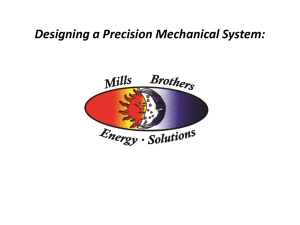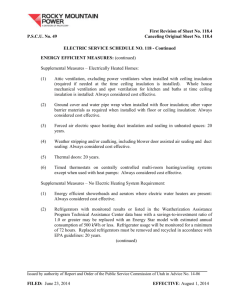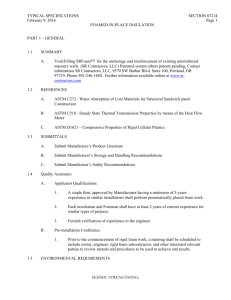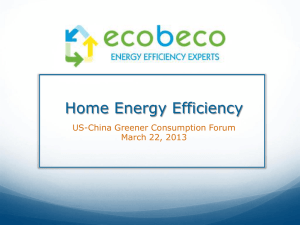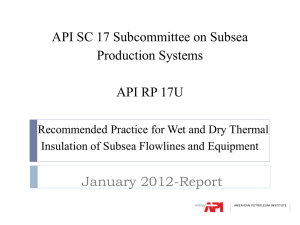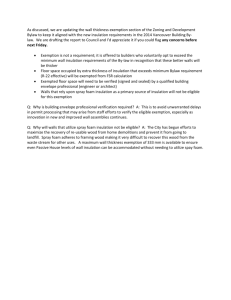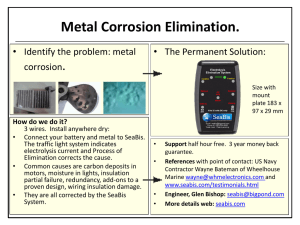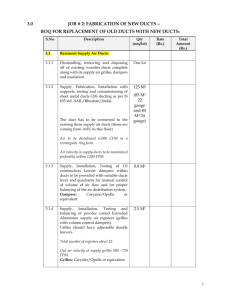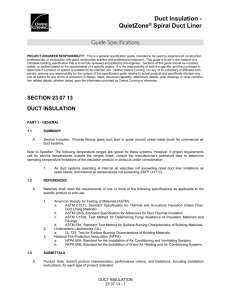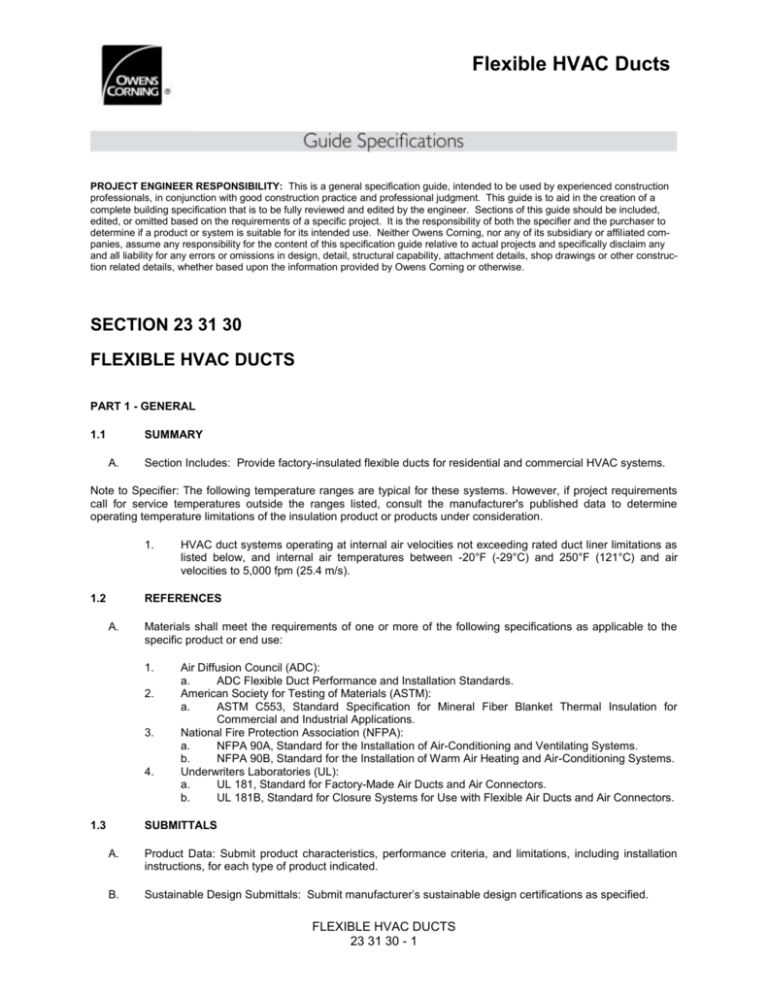
Flexible HVAC Ducts
PROJECT ENGINEER RESPONSIBILITY: This is a general specification guide, intended to be used by experienced construction
professionals, in conjunction with good construction practice and professional judgment. This guide is to aid in the creation of a
complete building specification that is to be fully reviewed and edited by the engineer. Sections of this guide should be included,
edited, or omitted based on the requirements of a specific project. It is the responsibility of both the specifier and the purchaser to
determine if a product or system is suitable for its intended use. Neither Owens Corning, nor any of its subsidiary or affiliated companies, assume any responsibility for the content of this specification guide relative to actual projects and specifically disclaim any
and all liability for any errors or omissions in design, detail, structural capability, attachment details, shop drawings or other construction related details, whether based upon the information provided by Owens Corning or otherwise.
SECTION 23 31 30
FLEXIBLE HVAC DUCTS
PART 1 - GENERAL
1.1
SUMMARY
A.
Section Includes: Provide factory-insulated flexible ducts for residential and commercial HVAC systems.
Note to Specifier: The following temperature ranges are typical for these systems. However, if project requirements
call for service temperatures outside the ranges listed, consult the manufacturer's published data to determine
operating temperature limitations of the insulation product or products under consideration.
1.
1.2
HVAC duct systems operating at internal air velocities not exceeding rated duct liner limitations as
listed below, and internal air temperatures between -20°F (-29°C) and 250°F (121°C) and air
velocities to 5,000 fpm (25.4 m/s).
REFERENCES
A.
Materials shall meet the requirements of one or more of the following specifications as applicable to the
specific product or end use:
1.
2.
3.
4.
1.3
Air Diffusion Council (ADC):
a.
ADC Flexible Duct Performance and Installation Standards.
American Society for Testing of Materials (ASTM):
a.
ASTM C553, Standard Specification for Mineral Fiber Blanket Thermal Insulation for
Commercial and Industrial Applications.
National Fire Protection Association (NFPA):
a.
NFPA 90A, Standard for the Installation of Air-Conditioning and Ventilating Systems.
b.
NFPA 90B, Standard for the Installation of Warm Air Heating and Air-Conditioning Systems.
Underwriters Laboratories (UL):
a.
UL 181, Standard for Factory-Made Air Ducts and Air Connectors.
b.
UL 181B, Standard for Closure Systems for Use with Flexible Air Ducts and Air Connectors.
SUBMITTALS
A.
Product Data: Submit product characteristics, performance criteria, and limitations, including installation
instructions, for each type of product indicated.
B.
Sustainable Design Submittals: Submit manufacturer’s sustainable design certifications as specified.
FLEXIBLE HVAC DUCTS
23 31 30 - 1
Flexible HVAC Ducts
1.4
DELIVERY AND STORAGE OF MATERIALS
A.
Delivery: Deliver materials in manufacturer’s original packaging.
B.
Storage: Store and protect products in accordance with manufacturer’s instructions. Store in a dry indoors
location. Protect insulation materials from moisture and soiling.
C.
Do not install insulation that has been damaged or wet. Remove it from jobsite.
1.5
WARRANTY
A.
Special Warranty: Please consult with flexible duct manufacturer regarding warranty details.
PART 2 - PRODUCTS
2.1
MANUFACTURER
A.
2.2
Manufacturers: Subject to compliance with requirements, provide products by one of the following:
1.
ATCO Rubber Products, Inc.; www.atcoflex.com
2.
Thermaflex; www.thermaflex.net
3.
J.P. Lamborn Co. (JPL); www.jplflex.com
4.
Gray Flex Systems Inc.; www.grayflex.com
5.
Acosta; www.acostamfg.com
6.
Buckley; www.buckleyonline.com
7.
Casco C.A. Schroeder, Inc; www.casco-flex.com
8.
Cody Company, Inc.; www.codycompany.com
9.
Deflecto, LLC - Canada; www.deflecto.com
10.
Enterprises Techniflex, Inc.
11.
Flexmaster Canada/Novaflex; www.flexmaster.com
12.
Flexmaster USA/Masterduct, Inc.; www.flexmasterusa.com
13.
Imperial Manufacturing Group; www.imperialgroup.ca
14.
Modular Metal Fabricators Inc.
15.
Peppertree Air Solutions Inc.; www.peppertreeairsolutions.com
16.
ThermoFlo Technologies Ltd.; www.thermoflotech.com
17.
Z-Flex U.S. Inc.; www.z-flex.com
FACTORY-INSULATED FLEXIBLE DUCTS
A.
Certifications:
1.
2.
3.
B.
EcoTouch® Insulation for Flexible Duct is GREENGUARD Indoor Air Quality Certified ® and
GREENGUARD Gold Certified.
EcoTouch® Insulation for Flexible Duct is certified by SCS Global Services to contain a minimum of
53% recycled glass content, 31% pre-consumer and 22% post-consumer.
EcoTouch® Insulation is the only fiberglass insulation product listed in the USDA BioPreferred ®
Catalog.
Factory-Insulated, Flexible Ducts: UL 181, Class 1, film supported by helically wound, spring-steel wire;
fibrous-glass insulation; and vapor-barrier film.
1.
Insulation: ASTM C553, Type I, glass fibers bonded with a thermosetting resin.
FLEXIBLE HVAC DUCTS
23 31 30 - 2
Flexible HVAC Ducts
2.
3.
2.3
a.
Acceptable Product: Owens Corning™ EcoTouch® Insulation for Flexible Duct.
Types and Sizes:
a.
Type R-4.2, 1-1/4 in (31mm) thick, NRC 0.65.
b.
Type R-6, 1-3/4 in (46mm) thick, NRC 0.65.
c.
Type R-8, 2-1/4 in (57mm) thick, NRC 0.65.
External Vapor Barrier Jacket Materials:
a.
Metalized, reinforced polyester.
b.
Reinforced grey polyester.
c.
Black polyethylene.
d.
Heavy-duty black polyethylene vapor barrier (4 mil thick), in compliance with HUD
requirements for outdoor mobile home or modular home installation.
ACCESSORY MATERIALS
A.
Accessories: Provide accessories per flexible duct system manufacturer’s recommendations, including the
following:
1.
2.
3.
4.
Air Connectors: Non-insulated, UL 181 air connector, polyester and aluminum foil.
Tape: UL 181B-FX.
Clamps:
a.
Metal Clamps: 1/2 in wide aluminum, galvanized steel, or stainless steel.
b.
Nonmetallic Clamps: UL 181B-C, nylon straps.
Mastics: UL 181B-M.
PART 3 - EXECUTION
3.1
EXAMINATION
A.
Verify that materials and accessories can be installed in accordance with Contract Documents and
material manufacturers' recommendations.
B.
Verify, by inspecting product labeling, submittal data, and/or certifications which may accompany the
shipments, that materials and accessories to be installed on the project comply with applicable
specifications and standards and meet specified thermal and physical properties.
C.
Before starting work under this section, carefully inspect the site and installed work of other trades and
verify that such work is complete to the point where installation of materials and accessories under this
section can begin.
3.2
SAFETY PRECAUTIONS
A.
3.3
Insulation contractor's employees shall be properly protected during installation of insulation. Protection
shall include proper attire when handling and applying insulation materials, and shall include, but not be
limited to, disposable dust respirators, gloves, hard hats, and eye protection.
INSTALLATION
A.
Install flexible duct systems, including connections and joints, in accordance with manufacturer’s
installation instructions, ADC Flexible Duct Performance and Installation Standards Chapter 4 “Installation
Requirements”, and with UL 181, Class 1 Air Duct.
FLEXIBLE HVAC DUCTS
23 31 30 - 3
Flexible HVAC Ducts
B.
Support flexible ducts at manufacturer’s recommended intervals, but not greater than 5 ft., by use of
hanging devices, approved by local authorities having jurisdiction. Do not allow sag of greater than 1/2 in
per foot of spacing between supports.
C.
Install flexible connectors to connect ducts to equipment.
D.
Seal penetrations and tears in vapor barrier with tape.
3.4
FIELD QUALITY ASSURANCE
A.
Upon completion of insulation work and before operation is to commence, visually inspect the work and
verify that it has been correctly installed.
B.
Open all system dampers and turn on fans to blow all scraps and other loose pieces of material out of the
duct system. Allow for a means of removal of such material.
C.
Check the duct system to ensure that there are no air leaks through joints.
3.5
PROTECTION
A.
Replace damaged insulation, which cannot be satisfactorily repaired, including insulation with duct liner
damage and moisture-saturated insulation.
B.
The insulation contractor shall advise the general and/or the mechanical contractor as to requirements for
protection of the insulation work during the remainder of the construction period, to avoid damage and
deterioration of the finished insulation work.
END OF SECTION
Pub. No. 10019405
© 2014 Owens Corning. All Rights Reserved.
FLEXIBLE HVAC DUCTS
23 31 30 - 4

